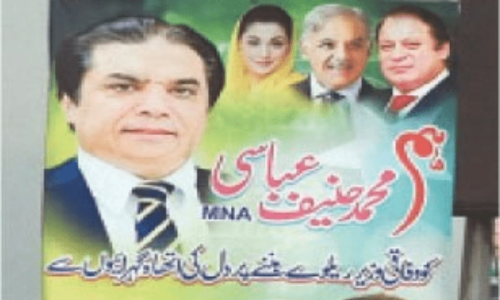WASHINGTON, Feb 15: President George W. Bush said on Thursday that the United States was funding the construction of 100 border posts along the Pakistan-Afghan border to provide Pakistan better access to this remote region.
The US, he said, was also providing Pakistan air support to help fight the terrorists operating in the tribal belt.
“We've given him (President Musharraf) high-tech equipment to help the Pakistani forces locate the terrorists attempting to cross the border. We're funding an air wing, with helicopters and fixed-wing aircraft, to give Pakistan better security, better swift response and better surveillance,” he said.
Mr Bush said the part of US strategy is to help President Musharraf defeat the terrorists and extremists who operate inside of Pakistan and for that “we're going to work Pakistan and Afghanistan to enhance cooperation to defeat what I would call a common enemy.”
In his speech at Washington’s conservative American Enterprise Institute, the US president expressed strong support for his Pakistani counterpart.“People say, well, do you think President Musharraf really understands the threat of extremists in his midst? I said, yes, I do. You know how I know? They've tried to kill him,” he said.
“Al Qaeda has launched attacks against the president of this country. He understands. He also understands that extremists can destabilise countries on the border, or destabilise countries from which they launch their attacks. And so he's launched what they call a frontier strategy and that is, to find and eliminate the extremists and deliver a better governance and economic opportunity.”
He said that with US support President Musharraf was going to better be able to now deal with this problem.
Mr Bush said that during his recent visit to Pakistan his defence secretary received “a good response” from President Musharraf, “an ally in this war on terror and it's in our interest to support him in fighting the extremists”.
Mr Bush recalled that at a dinner he hosted for President Pervez Musharraf and his Afghan counterpart Hamid Karzai on Sept 28, he had urged the two leaders to put aside their differences and “strategise together” on ways to defeat the common enemy of terrorism.
Mr Bush disclosed that he also met the two leaders privately to discuss shared interests. Despite tensions of their history, Mr Bush said, both agreed to share intelligence and expand trade.
Mr Bush said he also offered economic incentives to the two countries to end their differences, telling their leaders that Afghan and Pakistani entrepreneurs could export locally produced products to the United States duty free. "It's a tiny contribution for us … a major contribution for them,” he added.
Mr Bush said he hoped to help President Musharraf repel Taliban forces that had been holed up in the mountains between the two countries.
He announced that he was sending additional US troops and funds to Afghanistan to defeat an expected spring assault from the Taliban and urged Nato to do more, too.
We'll deploy a replacement force that will sustain this increase for the foreseeable future, said Mr Bush. To buttress the Afghan government against expected attacks in the future, he said he was asking Congress for $11.8 billion "to help this young democracy survive".
"When our commanders on the ground say to our respective countries `We need additional help', our Nato countries must provide it, he told an audience of mainly lawmakers, diplomats and academics.
Mr Bush also urged some Nato countries to change their policy of not allowing their troops in Afghanistan’s combat zones. "Allies must lift restrictions on the forces they do provide so Nato commanders have the flexibility they need to defeat the enemy wherever the enemy may make its stand," he said.
Mr Bush said he had extended the stay of 3,200 US troops now in Afghanistan for four months and he would deploy a replacement force for the future as well.
Mr Bush said the US and Nato would also help increase Afghanistan's security forces -— doubling the Army's size to 70,000 from 32,000 over the next two years.
The US president outlined an ambitious plan -— from increasing the Afghan security and police forces to building the country's rural economy, in an effort -— to stabilise the population. Among the important steps, he said, was helping to rebuild Afghanistan's highway system, and attacking poppy cultivation, which he called "a direct threat to a free future", and fight corruption in the courts.















































